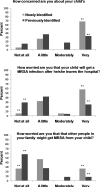Knowledge, awareness, and attitudes regarding methicillin-resistant Staphylococcus aureus among caregivers of hospitalized children
- PMID: 20961568
- PMCID: PMC3026884
- DOI: 10.1016/j.jpeds.2010.09.008
Knowledge, awareness, and attitudes regarding methicillin-resistant Staphylococcus aureus among caregivers of hospitalized children
Abstract
Objectives: To explore knowledge, awareness, and attitudes among caregivers of hospitalized children with regard to methicillin-resistant Staphylococcus aureus (MRSA).
Study design: We developed and administered a bedside questionnaire to caregivers of hospitalized children in contact isolation for MRSA colonization or infection.
Results: Of 104 caregivers approached, 100 (96%) consented to participate. The caregivers' children included 28 (28%) newly recognized as colonized or infected with MRSA during the hospitalization and 72 (72%) previously identified as colonized or infected with MRSA. Eighteen (18%) caregivers had no knowledge of MRSA. Twenty-nine (29%) were unaware that their child had MRSA, including caregivers of 9 newly identified patients with MRSA and 20 patients with previously identified MRSA. Of the 71 caregivers aware of their child's MRSA status, 89% had concerns; 77% worried about risks of future MRSA infection, 51% worried about spreading MRSA, and 16% described a feeling of stigma. Worries were more common among caregivers of children with newly identified MRSA (P < .05).
Conclusion: Caregivers of children hospitalized with MRSA are frequently unaware that their child has MRSA. Among those aware of their child's MRSA status, many have concerns and worries. Caregivers of children with newly identified MRSA more often are worried and may need additional education and reassurance.
Copyright © 2011 Mosby, Inc. All rights reserved.
Figures

Comment in
-
Changes over time in caregivers' knowledge, attitudes, and behaviors regarding methicillin-resistant Staphylococcus aureus.J Pediatr. 2011 Jun;158(6):1039. doi: 10.1016/j.jpeds.2011.01.020. Epub 2011 Feb 24. J Pediatr. 2011. PMID: 21353247 Free PMC article. No abstract available.
References
-
- Gorwitz RJ, Kruszon-Moran D, McAllister SK, McQuillan G, McDougal LK, Fosheim GE, et al. Changes in the prevalence of nasal colonization with Staphylococcus aureus in the United States, 2001-2004. The Journal of infectious diseases. 2008;197:1226–34. - PubMed
-
- Henderson DK. Managing methicillin-resistant staphylococci: a paradigm for preventing nosocomial transmission of resistant organisms. American journal of infection control. 2006;34:S46–54. discussion S64-73. - PubMed
-
- Robicsek A, Beaumont JL, Paule SM, Hacek DM, Thomson RB, Jr., Kaul KL, et al. Universal surveillance for methicillin-resistant Staphylococcus aureus in 3 affiliated hospitals. Annals of internal medicine. 2008;148:409–18. - PubMed
-
- Calfee DP, Salgado CD, Classen D, Arias KM, Podgorny K, Anderson DJ, et al. Strategies to prevent transmission of methicillin-resistant Staphylococcus aureus in acute care hospitals. Infect Control Hosp Epidemiol. 2008;29(Suppl 1):S62–80. - PubMed
Publication types
MeSH terms
Grants and funding
LinkOut - more resources
Full Text Sources
Medical

